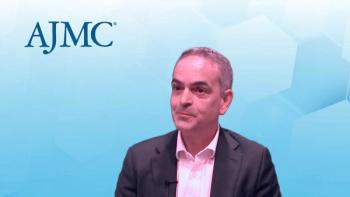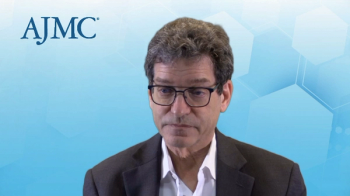
Many people believe health equity is such a big issue that there is not much an individual practice can do to address it, explained Susan Sabo-Wagner, MSN, RN, OCN, executive director of clinical strategy, Oncology Consultants of Houston.

Many people believe health equity is such a big issue that there is not much an individual practice can do to address it, explained Susan Sabo-Wagner, MSN, RN, OCN, executive director of clinical strategy, Oncology Consultants of Houston.

While melanoma is one of the most aggressive cancers, making early detection crucial for outcomes, because it is visible on the surface, there are opportunities to catch it early, said Sancy Leachman, MD, PhD, professor and chair in the Department of Dermatology and director of the Melanoma Research Program at the Knight Cancer Institute at Oregon Health and Science University.

Jessica Allegretti, MD, MPH, medical director of the Crohn's and Colitis Center, Brigham and Women's Hospital, discusses the standard of care for the prevention and treatment of primary and recurrent Clostridioides difficile infection (CDI).

Dermatology lends itself well to telemedicine, particularly as a screening tool to reduce wait times and increase access to care for patients with high-risk melanoma, said Erik Jaklitsch, second-year medical student at the University of Pittsburgh.

Baseline risk assessment that includes prior treatment history for cancer, prior cardiovascular events, and markers for potential heart damage are all important, emphasizes Tochi M. Okwuosa, DO, cardiologist and director of cardio-oncology at Rush University Medical Center in Chicago.

With both biologics and Janus kinase (JAK) inhibitors available to treat atopic dermatitis, providers have more options for patients, said Emma Guttman-Yassky, MD, PhD, FAAD, of Mount Sinai.

Using the DataDerm database has uncovered disparities in prescription patterns, but it’s still early in the process of understanding why those disparities might exist, said Robert Dellavalle, MD, PhD, MSPH, and Ramiro Rodriguez, MD, both of University of Colorado School of Medicine.

There are certain considerations when choosing which patient is the best fit for a biologic to treat hidradenitis suppurativa, said Haley Naik, MD, FAAD, associate professor of dermatology, University of California, San Francisco, School of Medicine.

Similar to other therapies, approximately 40% of patients with vitiligo who stopped treatment with ruxolitinib cream relapsed, but they achieved repigmentation once treatment was reinitiated, explained John Harris, MD, PhD, FAAD, director of the Vitiligo Clinic and Research Center at UMass Chan Medical School.

Many people often don’t connect the dots between climate change and its impact on skin health, but these effects have been happening for years, said Eva R. Parker, MD, associate professor of dermatology at Vanderbilt University Medical Center.

At the American Academy of Dermatology annual meeting there will be multiple presentations on hot topics and the latest advances in microneedling, explained Monica Li, MD, clinical instructor, Department of Dermatology and Skin Science, University of British Columbia.

It's harder for younger children to deal with the complexities of managing type 1 diabetes (T1D), so a delayed diagnosis even by a few years is a big deal, said Kevan Herold, MD, professor of immunobiology and medicine at Yale School of Medicine.

Stephen M. Schleicher, MD, MBA, Tennessee Oncology and Community Oncology Alliance (COA) Board of Directors member, discusses what brings him back to the Community Oncology Conference year after year.

Kimberly Westrich, director of value and access strategy at AmerisourceBergen, previews AMCP 2023 and her preconference session about incorporating value framework assessments into coverage and reimbursement decision-making.

In this preview of the 2023 Community Oncology Conference, past president of the Community Oncology Alliance, David Eagle, MD, of New York Cancer & Blood Specialists, discusses what has him excited for this year's meeting, both sessions and speakers.

Edward W. Boyer, MD, PhD, medical toxicologist at The Ohio State University, discusses chemical exposure, health complaints, and clean-up plans for the train derailment in East Palestine, Ohio.

There is a lot to talk about in the vitiligo space at this year’s annual meeting of the American Academy of Dermatology (AAD), said John Harris, MD, PhD, FAAD, director of the Vitiligo Clinic and Research Center at UMass Chan Medical School.

Manmeet Ahluwalia, MD, MBA, chief, Solid Tumor Medical Oncology; deputy director; and chief scientific officer at Miami Cancer Institute, addressed disparities in genomic testing among minority patients with cancer, as well as equitable care strategies at his organization’s Center for Equity in Cancer Care & Research.

Jessica Allegretti, MD, MPH, medical director of the Crohn's and Colitis Center, Brigham and Women's Hospital, spoke on antibiotic use and other risk factors for the development of Clostridioides difficile infection.

Jeff Hunnicutt, CEO of Highlands Oncology Group, explains the 2 risk options provided under the Enhancing Oncology Model (EOM) and why the mandatory downside risk might give pause to practices that saw some success in the Oncology Care Model.

As scientists are identifying molecular alterations in patients with later-stage cancers that may be targets in earlier-stage disease, next-generation sequencing is being utilized more in the first-line setting, noted Sigrun Hallmeyer, MD, medical oncologist with Advocate Health.

Kevin Davies, PhD, executive editor, The CRISPR Journal and GEN Biotechnology, discusses how CRISPR has evolved from the initial discovery of the double helix to now, with the technology holding great promise for both genetic diseases and cancers.

Andre Harvin, PharmD, MS, MBA, Cone Health Cancer Center, discusses the vital role of pharmacists in oncology: how they use data to streamline patient visits, work to facilitate patient access to biosimilars, and advocate for their patients.

There is clearly an important role for teplizumab to treat type 1 diabetes (T1D) right now, said Kevan Herold, MD, professor of immunobiology and medicine at Yale School of Medicine.

Ajai Chari, MD, professor of medicine and director of clinical research in the Multiple Myeloma Program at Mount Sinai in New York, discusses a post-hoc analysis of data from the phase 2 GRIFFIN trial.

Samyukta Mullangi, MD, MBA, oncology fellow at Memorial Sloan Kettering Cancer Center and incoming medical director at Thyme Care, spoke on financial toxicity, heterogeneity of cancer, and other complex factors in oncology care systems that may perpetuate disparities in health care outcomes and delivery among patients.

Lee Greenberger, PhD, chief scientific officer of the Leukemia and Lymphoma Society, discusses how the pandemic changed clinical trial enrollment in the leukemia/lymphoma space.

Olalekan Ajayi, PharmD, MBA, chief operating officer of Highlands Oncology Group, PA, and 2023-2024 president-elect of the Association of Community Cancer Centers (ACCC), discusses why he is excited for this year’s meeting, including its many workshops and day 1 keynote on CRISPR.

Edward W. Boyer, MD, PhD, medical toxicologist, The Ohio State University, shares his thoughts on possible reasons why residents in East Palestine, Ohio, are reporting smelling chemicals, feeling ill, and developing rashes.

Carolina Blood and Cancer Care Associates’ No One Left Alone initiative works to dismantle cancer health disparities and increase health care equity among its rural patient population. Sashi Naidu, MD, director of research, discusses delivering next-generation sequencing testing to patients.

259 Prospect Plains Rd, Bldg H
Cranbury, NJ 08512
© 2025 MJH Life Sciences®
All rights reserved.
